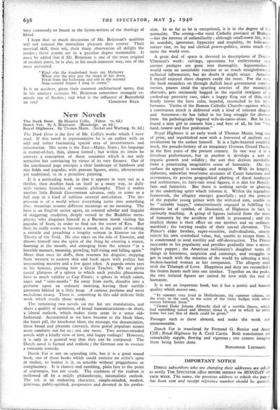New Novels
Royal Highness. By Thomas Mann. (Seeker and Warburg. 8s. 6d.) The Dark Door is the first of Mr. Collis's works which I have read. If this novel is representative he is an author with an odd and rather fascinating special area of inventiveness and information. His scene is the East—Malay, Siam; his language is matter-of-fact, thin, almost formal; but within its limits he conveys a conception of these countries which is not only attractive but convincing by virtue of its very flatness. Out of the uncoloured page emerges a clear landscape of bamboos and rice fields and pagodas, with peasant figures, static, idiosyncratic yet traditional, as in a primitive painting. It is a misleading book, in that it appears to start out as a thriller, then doubles back on itself in a mazy way, to dally with various branches of esoteric philosophy. Then it makes another little British Government advance, only to come to a full stop in a kind of sublime oriental anti-climax. The im- pression is of a world where everything turns into something else: meanings assume different meanings or no meaning. The hero is an English secret agent, an oriental scholar and linguist of staggering erudition, deeply versed in the Buddhist meta- physic, who disguises himself as a Burmese monk visiting the pagodas of Siam, in order to find out the secret of Kra. But then he really seems to become a monk, to the point of working a miracle and preaching a lengthy sermon in Siamese on the Theory of the Void. He also takes on the role of Exorcist, and throws himself into the spirit of the thing by entering a trance, foaming at the mouth, and emerging from the seizure "in a horrible manner, moaning, growling, half-rising and falling again." More than once he doffs, then resumes his disguise, stepping from western to eastern skin and back again with perfect but unassuming mastery and a few quiet jokes. A pagoda emits rays in his honour, proving him a Great Teacher. We are given casual glimpses of a sphere in which such psychic phenomena have as much validity as Cup Finals: a sphere in which saints, sages and " semi-monks " flit away from earth, dissolve into a perfume upon an ordinary morning, leaving their earthly garments behind in a little heap. A curious perfume and most melodious twang. There is something in this odd delicate little work which recalls those words.
The remaining two novels on my list are translations, and share a quality of optimism, of broad humanitarianism—in short, a liberal outlook, which makes them seem in a sense old- fashioned. Accustomed as we have become to the bleak blast, the bitter pill, the knock-out blow, the message, the denunciation, these broad and pleasant canvases, these genial populous scenes seem comforts not for us; not any more. Two serious-minded novels with a kindly view of love, and happy endings! However, it is only in a general way that they can be compared. The Dutch novel is factual and realistic; the German one in essence a romantic comedy. Dutch Vet is not an appealing title, but it is a good sound book, one of those books which could exercise no critic's spite or malice, so honest is it, so sensible without priggishness or complacency. It is clumsy and rambling, plain fare to the point of coarseness, but not crude. The starkness of the realism is mellowed off by a mildly philanthropic, rationalistic outlook. The vet, is an endearing character, simple-minded, modest, generous, public-spirited, progressive and devoted in his profes- sion. In so far as he is exceptional, it is in the degree of his normality. The setting—the rural Catholic province of Brabant —has the interest of unfamiliarity; although small-town life, with its scandals, ignorance, hypocrisy and stupidity, its hole-and- corner vice, its lay and clerical power-politics, seems much the same the world over.
A great deal of space is devoted to descriptions of Doctor Vlimmen's work: calvings, operations for embryotomy and uterine prolapse are gone into thoroughly. Squearnishnc
It is not an important book, but it has a poetic and human quality which moves one. "In summer tney lived in Hollerbrunn, the summer schloss, on the river, in the cool, in the scent of the violet hedges with white statues between them." "Grand Duke Johann Albrecht died of a terrible illness, which had something naked and abstract about it, and to which no other name but just that of death could be given." Passages such as these abound, and make the work not unmemorable. Dutch Vet is translated by Fernand G. Renice and Anne Cliff ; Royal Highness by A. Cecil Curtis. Both translations are remarkably supple, flowing and vigorous; one cannot imagine them being better done. ROSAMOND LEHMANN.


































 Previous page
Previous page